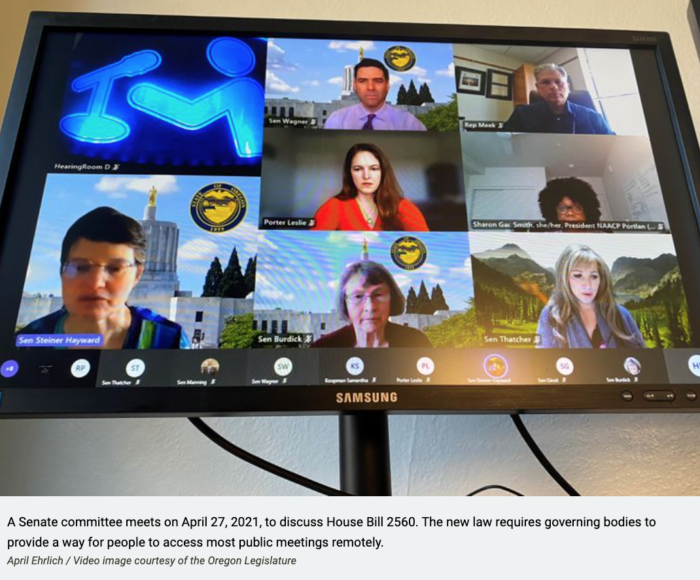 Here in Oregon a new law mandates that all public meetings must have a virtual component. It is no longer acceptable to do only an in-person meeting.
Here in Oregon a new law mandates that all public meetings must have a virtual component. It is no longer acceptable to do only an in-person meeting.
This is great news, especially for people who want to have diverse and inclusive conversations about public transit.
In the old world, pre-2020, the default public meeting was in person. If you wanted to express your view, you had to clear your schedule at the appointed time and travel to a meeting site — which was especially onerous for people who don’t drive. The result was a process that is biased against people who are busy. Most people don’t have the time that in-person meetings require.
When it comes to public transit, there is a direct tension between the interests of busy people — who tend to care about getting places quickly — and those of many people who have spare time. To take one example, retired people often tell me that they need a bus right at their door, but that it’s fine if it comes once an hour, because they can plan around that. That’s great for them, but that kind of service is useless to anyone whose day is full of deadlines they don’t control: punching a time clock, getting to class, picking up the kid at daycare.
The only way we get functional, just, and inclusive transit is for people with different needs to listen to each other. That only happens if everyone has the opportunity to contribute, as they do in virtual events.
The other issue, of course, is that virtual meetings can be civil, because the moderator has tools to cut people off if they are rude, profane, or off-topic[1] or speaking too long. All forms of physical intimidation, however subtle, are also off the table [2]. Those behaviors have become another good reason to avoid public meetings.
The in-person event shouldn’t disappear until we’ve fully replaced it for everyone who really needs it, but the exigences of the pandemic have made far more people comfortable with virtual meetings, and there are a range of ways to reach those who still aren’t. Oregon’s law doesn’t ban in-person meetings, of course. It just says that a process that’s only in-person is no longer acceptable, because it just excludes too many people. I hope we’ll see this spread far and wide.
————–
NOTES
[1] At a Cleveland meeting a few years ago, where I was presenting about our bus network design project, one lady devoted her three minutes to probing whether I was married, and if not, what I was doing about that.
[2] Then there was the meeting in a Western US city, years ago, where one belligerent gentleman testified while keeping one hand in his pocket, holding a clearly gun-shaped object.
Seems totally logical and inclusive to me. Any way that allows more people to share their thoughts (about transit or marriage) can only create better results.
Online options make a lot of sense for inclusion. But, we should be careful about abandoning in person meetings and events. There is something real to be gained by sitting down with people. What I find effective is ‘pop-up’ events where you go to where the people are: transit centre, shopping centre, rec centre, whatever. Set-up shop and give people the info and your ear. Many people are excited to talk for five minutes, but can’t give up two hours. This doesn’t replace meetings (where people talk to and listen to each other) but is a good tool.
Having moderated or presented at both types of meetings, I don’t find the level of civility to be markedly different between in-person and online. It comes down to the quality of moderation more than the technology. In-person may be tougher, but you can still cut off someone’s mike or make them sit down and be quiet.
If people avoid in-person meetings due to intimidation from other people present, how is that an argument in favor of public transit? Wouldn’t there be a possibility that when that person rides transit they may encounter the person that they think intimidates them? If anything that’s an argument in favor of separate cabins, if not completely separate vehicles.
People don’t generally yell at each other on transit. It’s not the person that’s intimidating, it’s the person getting up at a meeting and yelling. People get heckled at meetings sometimes.
I’ve had residents tell me after meetings they disagreed with the broad tone of the meeting, but were too intimidated to stand up and speak against the room. Public speaking intimidates most people to start with.